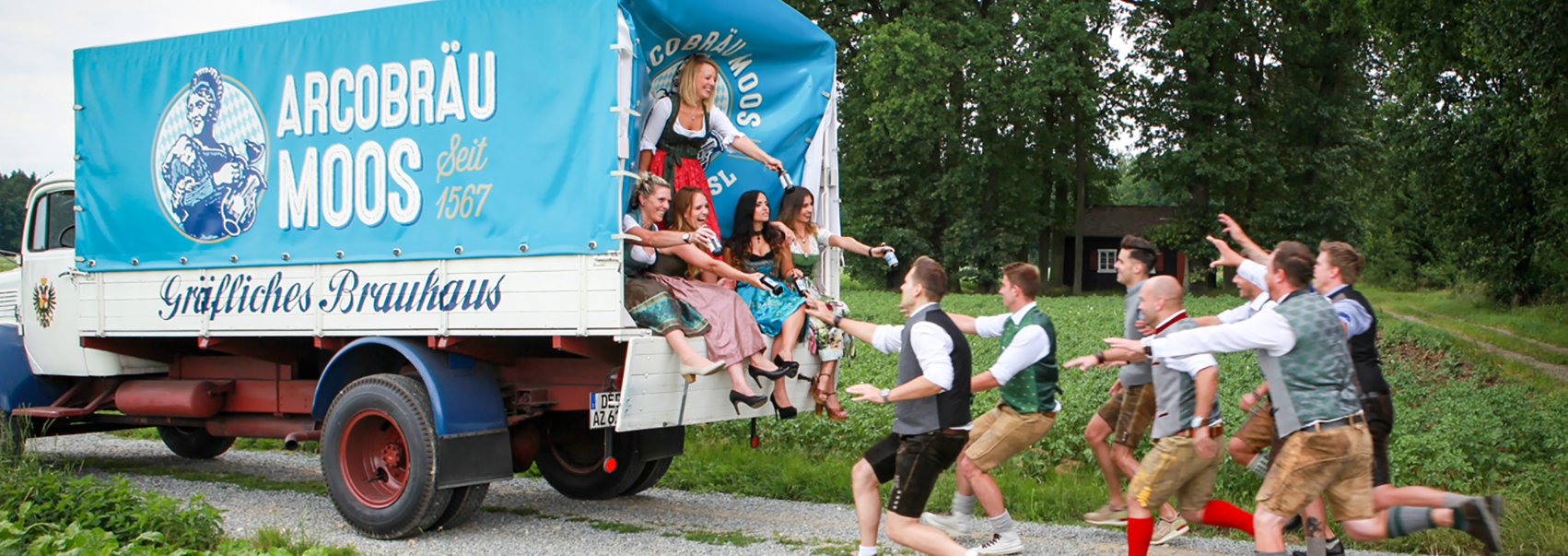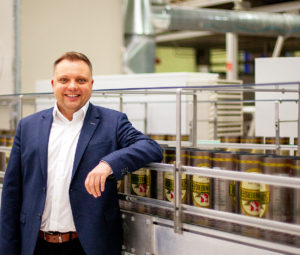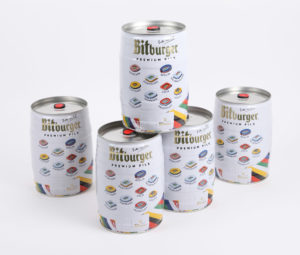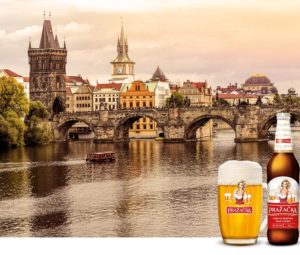“Either we do something quickly – or not at all.” It is precisely this determination that is probably Holger Fichtel’s recipe for success. Whether it’s the installation of a dealcoholization plant, the foreign business, or his new mono-brand “Mooser Liesl” – the Arcobräu boss is almost always a step ahead of the competition with his beer-related decisions. Already an “old hand” in the business, he is still bursting with energy, openness and drive. After studying economics, Fichtel worked successfully for many years as a sales manager in beverage logistics. As brewery director at Gräfliches Brauhaus Arcobräu in Moos, he returned to his professional roots in 2004. As a skilled and studied brewer, he simply feels most at home near a brewhouse. And you can sense his inner satisfaction when he happily states, “I’ve turned my hobby into my profession.”
Mono-brand “Mooser Liesl” achieves cult status as a beer
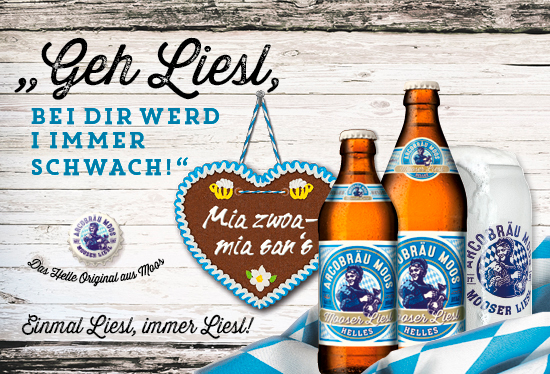
Holger Fichtel hit the big time in 2015 with Mooser Liesl. The beverage magazine voted the newly launched “Helles-style” beer “Product Innovation of the Year” in 2016, and just one year later “Drink of the Year” in the “German Beer” category. In the meantime, “Mooser Liesl” from Arcobräu in Lower Bavaria is one of the most successful “Helles-style” beers in Germany. From Hamburg to Munich, from Berlin to Stuttgart, people drink the “cult beer”. For Holger Fichtel, this success is more than a lucky accident and certainly no coincidence. His conviction is: “The ‘Mooser Liesl’ is the only “Helle” with a holistic philosophy.”
He has not let hurdles, doubts or setbacks knock him down. “We fiddled with the brand identity for four years, spent a whole year working on the brewing and mashing recipe, and almost wanted to give up everything in between,” recalls the resolute brewery boss. According to Fichtel, the fact that the mono-brand “Mooser Liesl” became a shooting star in the “Helles-style” beer segment within a short period of time is due to “seven secrets” that he naturally doesn’t want to reveal. What is certain, however: Fichtel’s “all or nothing” mentality was the key to success here, too.
World premiere: a “talking beer label”
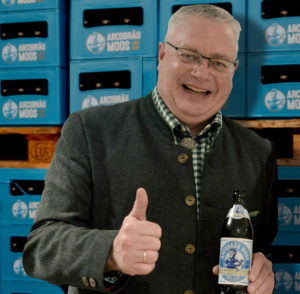
Holger Fichtel, managing director of Arcobräu
In his new creation, “the special taste” and “a high level of drinkability” were the top priorities for the trained brewer right from the start. “Mooser Liesl” was not to be sold as just another beer under the Arcobräu umbrella, but as an independent mono-brand to tap into new target groups. Another priority for Fichtel: the Euro bottle (“in 2015, we were still one of the first to use it for Helles-style beers”) and a good label. This is also a world first, because it can even “speak.” By downloading a free app and holding your smartphone camera in front of the bottle label, you bring the Liesl to life and it tells you its story.
The name “Mooser Liesl” and the story behind it are ultimately the core of the brand. Here, too, Holger Fichtel left nothing to chance, because from the very beginning he wanted a personified brand with a connection to the Arcobräu history. To find this, countless documents were painstakingly viewed – from books and historical labels to old postcards and photos. In the process, they finally came across the Liesl, a pretty waitress who once served beer from a can in the castle inn and was known far beyond the borders of Moos as a trademark of the brewery. The name “Mooser Liesl” was born.
“What costs nothing is worth nothing”
However, his plan to position the new “Helles-style” beer in the high-price segment, of all places, provoked some doubters. But Fichtel was certain that “what costs nothing is worth nothing.” That’s why the “Mooser Liesl” was initially not available in retail stores, but exclusively in the restaurant trade – although deliberately not on tap. Fichtel supplied the serving instructions at the same time: “The “Mooser Liesl” is poured directly at the table into an iced stone jug.” The branded stone jugs – by the way, handmade, salt-glazed and correspondingly high-priced – had to be purchased by the innkeepers themselves. Despite all the prophecies of doom, Fichtel’s strategy worked. Probably also because he did not skimp on advertising for the market launch, so that many guests in the catering trade specifically asked for the new “Mooser Liesl”. Because the taste was also completely convincing, it rose to become a “cult beer” throughout Germany within a very short time.
Several pillars carry the success of Arcobräu
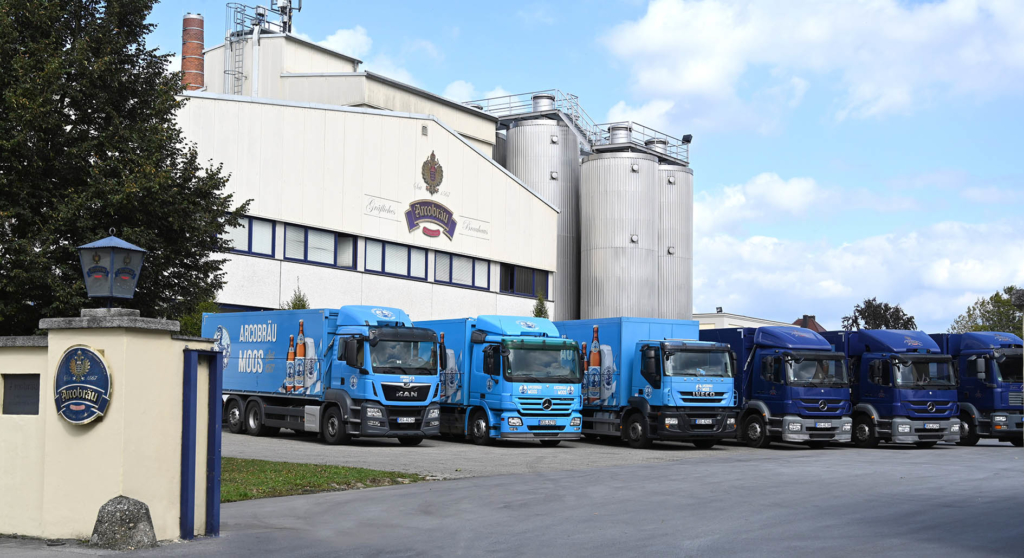
The success of the “Mooser Liesl” is the result of a long entrepreneurial journey. Getting the somewhat dusty castle brewery with its centuries-old tradition back on track was a lot of work. An investment and maintenance backlog of around 14 million euros and an annual output of only 80,000 hectoliters – when Fichtel took over the management of Arcobräu at the age of just 38, the starting position was not exhilarating. He quickly realized that “Lower Bavaria as a core market is far too small”. That’s why he built his business strategy on several pillars. Always with the claim to be quicker than the others. As early as 2006 – well before the ” non-alcoholic trend” was on everyone’s lips – Arcobräu put a dealcoholization plant into operation. On the Landshut-Munich axis, Fichtel staked out his territory early on, before others could open up the market for themselves. And it was clear to him: “In order to continue growing, our beer has to be shipped abroad!”
Because the American market was already occupied, Fichtel turned his attention to the East. To gain a foothold in Asia as one of the first German medium-sized brewers, he had to do some pioneering work. Fichtel also did this with determination, however without taking too many risks: “We sold the first 100,000 hectoliters abroad on a pure commission basis.” He invested the first money earned abroad directly back at home and modernized various pubs that serve Arcobräu and thus serve as a flagship for the brewery. With this mixture of determination, foresight and reliable gut feeling, Holger Fichtel quickly won the trust of the recently deceased Arco owner Riprand Graf von und zu Arco-Zinneberg, who backed the go-getting brewery director in all decisions.
“Minikeg makes a brand”
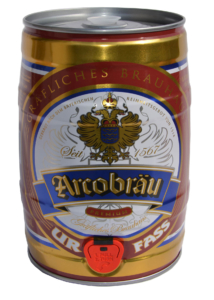
Arcobräu is now on the market in around 30 countries. The foreign business is one of the brewery’s most important pillars. The mini-keg also plays a part in this. After all, as a disposable container, the five-liter can is ideal for the export market. Fichtel, who appreciates the long and trusting business relationship with Envases, generally likes to use the mini-keg in all sales channels – both at home and abroad. The “extremely communicative container” is “particularly interesting for him in terms of branding“. Or as he puts it in a nutshell: “Minikeg makes a brand!”
“Franz Josef Helles” – the next beer on the way to become a successful mono-brand?
For Holger Fichtel, however, this is by no means the end of the story: Since Arcobräu itself offers little room to grow, he has recently expanded the company by taking over other breweries: in 2014, he added Castle Brewery Grünbach, in 2016 Castle Brewery Irlbach, and in 2018 Eschenbach Private Brewery in Eltmann. The annual output of the Arco Group is now around 400,000 hectoliters. It is important to the brewery director that independent products of the respective breweries are maintained or even strengthened. With another mono-brand – “similar, but not the same as with the ‘Mooser Liesl'” – he wants to write another success story. Here, too, a historical figure served as brand inspiration, namely the eldest son of the Eschenbach brewmaster, who was well-known in the village at the end of the 19th century as a long-standing master rifleman. “Franz Josef Helles” has been on sale since March 2021.
